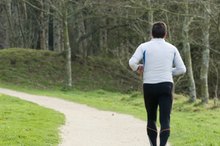What does fact checked mean?
At Healthfully, we strive to deliver objective content that is accurate and up-to-date. Our team periodically reviews articles in order to ensure content quality. The sources cited below consist of evidence from peer-reviewed journals, prominent medical organizations, academic associations, and government data.
- "British Journal of Sports Medicine"; High-Carbohydrate Diet for Long Distance Runners- A Practical View-Point; M. Fogelholm, et al.; June 1989
- "British Journal of Sports Medicine"; High-Carbohydrate Diet for Long Distance Runners- A Practical View-Point; M. Fogelholm, et al.; June 1989
The information contained on this site is for informational purposes only, and should not be used as a substitute for the advice of a professional health care provider. Please check with the appropriate physician regarding health questions and concerns. Although we strive to deliver accurate and up-to-date information, no guarantee to that effect is made.
How Many Calories to Eat the Morning Before a Half Marathon?
Success during a half marathon is directly correlated with nutrition a few days before the race, as well as breakfast the morning of the race. What and how much to eat may seem confusing, but the best plan is to keep it simple and eat foods that are familiar. Runners should focus on consuming calories from carbohydrates and limit the number of calories that come from protein and fat the morning of the event 1.
Number of Calories
The goal of the morning meal is to enhance running performance without causing indigestion, nausea or stomach issues. Eating the right number of calories will help you reach this goal. Iowa State University Extension recommends that for a morning event, runners consume 300 to 400 calories about three to four hours before the event. If the half marathon will take longer than 90 minutes, runners can consume a snack of 100 to 200 calories about one to two hours before the event.
- The goal of the morning meal is to enhance running performance without causing indigestion, nausea or stomach issues.
- If the half marathon will take longer than 90 minutes, runners can consume a snack of 100 to 200 calories about one to two hours before the event.
Calories from Carbohydrates
Long Distance Running & Low Blood Sugar
Learn More
Carbo-loading involves consuming extra carbohydrates during the two to three days before an endurance event. It's based off the theory that the glycogen stored in your muscles before an event will influence your performance: With more glycogen stored, you’re able to compete longer and harder. According to the Nutrition Working Group of the Medical Commission of the International Olympic Committee, the biggest mistake endurance runners can make is not eating enough carbohydrates during the one- to six-hour time period before an event. The committee recommends runners eat 1 to 4 grams of carbohydrates for every kilogram of body weight six hours before the event. To convert that to calories, calculate your body weight in kilograms by taking your weight in pounds and dividing it by 2.2. Take your weight in kilograms, and multiply by one to four to determine the number of grams of carbohydrates you should eat. Multiply your carbohydrate grams by four (the number of calories in 1 gram of carbs) to get the number of calories that you should eat. For example, a 150-pound person would be 68 kilograms, multiplied by 2 grams to get 136 grams of carbohydrates. Then multiply 136 grams by four calories to get 544 calories.
- Carbo-loading involves consuming extra carbohydrates during the two to three days before an endurance event.
- Multiply your carbohydrate grams by four (the number of calories in 1 gram of carbs) to get the number of calories that you should eat.
Pre-Event Meal
The morning of the race runners should not try anything new or eat more than they have practiced during their training. Trail and error of what to eat, how much to eat and when to eat breakfast should occur during training. The goal of the morning meal is to provide endurance and energy for the upcoming race without causing gastrointestinal discomfort and issues. The time of day that the half marathon is taking place will also influence race morning breakfast. For morning events, dinner calories will be higher than breakfast calories in order to give the body more time to digest. For afternoon and evening events, runners should consume more calories for breakfast and lunch instead of eating them the night before. The Iowa State University Extension recommends that based on a 2,500-calorie diet, runners competing in a morning event should eat around 800 calories for dinner and snack the night before and about 300 calories for breakfast. For an afternoon and evening event, the main meal before the event should be about 600 calories, with a snack of around 300 calories.
- The morning of the race runners should not try anything new or eat more than they have practiced during their training.
- The goal of the morning meal is to provide endurance and energy for the upcoming race without causing gastrointestinal discomfort and issues.
Examples of Pre-Event Meals
Foods to Eat Before Track Meets
Learn More
Runners should remember to keep the pre-event meal heavy with carbohydrates and light in fat and protein. For a breakfast that has around 300 calories, eat 1.5 cups Cheerios with 1 cup skim milk and a small banana. An example of a meal with about 400 calories is a bagel topped with honey, some raisins, 1 cup of milk and a small banana, according to Anita Bean's "Complete Guide to Sports Nutrition."
Related Articles
References
Writer Bio
Julie Brock's research has been published by the American College of Sports Medicine and Western Society of Kinesiology. She earned her Bachelor of Science in exercise science from California State University and is completing her Master of Public Health at American Public University.









